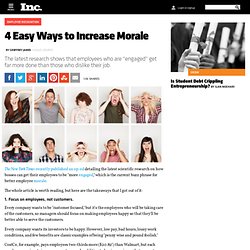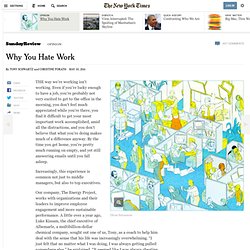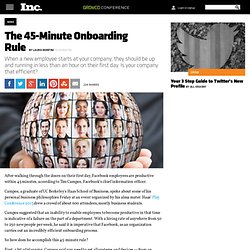

Feedly. Read more, know more. Even though self-awareness — knowing who we are and how we’re seen — is important for job performance, career success, and leadership effectiveness, it’s in remarkably short supply in today’s workplace.

In our nearly five-year research program on the subject, we’ve discovered that although 95% of people think they’re self-aware, only 10 to 15% actually are. At the office, we don’t have to look far to find unaware colleagues — people who, despite past successes, solid qualifications, or irrefutable intelligence, display a complete lack of insight into how they are coming across. In a survey we conducted with 467 working adults in the U.S. across several industries, 99% reported working with at least one such person, and nearly half worked with at least four. Peers were the most frequent offenders (with 73% of respondents reporting at least one unaware peer), followed by direct reports (33%), bosses (32%), and clients (16%). The Most Effective Way to Give Your Employees Feedback. Fortune. Management Advice From LinkedIn Founder Reid Hoffman. Wall Street Finds How to Best Drive Workers: Hand Them the Whip. Wall Street investment banks have found the key to getting employees to work longer and harder: Give them the power to set their own hours and time off.

Highly educated employees given autonomy over their own schedules end up working harder because they want to prove who can put in the most time at the office, University of Pennsylvania professor Alexandra Michel found (PDF) after spending 12 years studying the work habits of young executives at two large investment banks. Bankers, software engineers, and lawyers—so-called knowledge-based workers—often work more than 100 hours per week to the detriment of their health, even when nothing urgent demands their attention, she says.
4 Easy Ways to Increase Morale. The New York Times recently published an op-ed detailing the latest scientific research on how bosses can get their employees to be "more engaged," which is the current buzz phrase for better employee morale.

The whole article is worth reading, but here are the takeaways that I got out of it: 1. Focus on employees, not customers. Every company wants to be "customer focused," but it's the employees who will be taking care of the customers, so managers should focus on making employees happy so that they'll be better able to serve the customers. Every company wants its investors to be happy. Why You Hate Work. Photo THE way we’re working isn’t working.

Even if you’re lucky enough to have a job, you’re probably not very excited to get to the office in the morning, you don’t feel much appreciated while you’re there, you find it difficult to get your most important work accomplished, amid all the distractions, and you don’t believe that what you’re doing makes much of a difference anyway. The Best Hires Are Right Under Your Nose - Use This System to Never Miss Them Again. 3 Psychological Theories To Help You Communicate Better With Anyone. 5.5K Flares Filament.io 5.5K Flares × Psychological theories often feel a bit too complicated for me (I’m sure there’s a theory that explains why that is) but I’ve come across a few that are simple enough to understand and that I think of often, particularly when dealing with other people.

I thought it might be fun to take a brief look at a few psychological theories that are especially relevant for business, marketing, leadership and overall communication skills. Keep in mind I’m no professional psychologist, so if you’re keen to find out more about these, definitely dig deeper into the research about each one. Dunbar’s Number Professor Robin Dunbar is an evolutionary psychologist who developed a model for predicting social factors about primates, based on brain size. Robin Dunbar used the volume of the neocortex – the ‘thinking’ part of the brain – as his measure of brain size, because this accounts for most of the brain’s expansion within primates. Eight Essentials for Scaling Up Without Screwing Up - Robert I. Sutton. By Robert I.

Sutton | 11:00 AM February 10, 2014 Back in 2006, my colleague Huggy Rao and I launched an executive education program at Stanford called “Customer-focused Innovation.” Mornings consisted of lectures and case studies in a traditional classroom in the Stanford Business School; this was the “clean models” part of the program. In the afternoons, we moved the group to the (then) new Hasso Plattner Institute of Design, or “Stanford d.school,” for the “hands on” part.
That midday transition could be jarring. The 45-Minute Onboarding Rule. After walking through the doors on their first day, Facebook employees are productive within 45 minutes, according to Tim Campos, Facebook’s chief information officer.

Campos, a graduate of UC Berkeley's Haas School of Business, spoke about some of his personal business philosophies Friday at an event organized by his alma mater. Haas’ Play Conference 2013 drew a crowd of about 600 attendees, mostly business students.